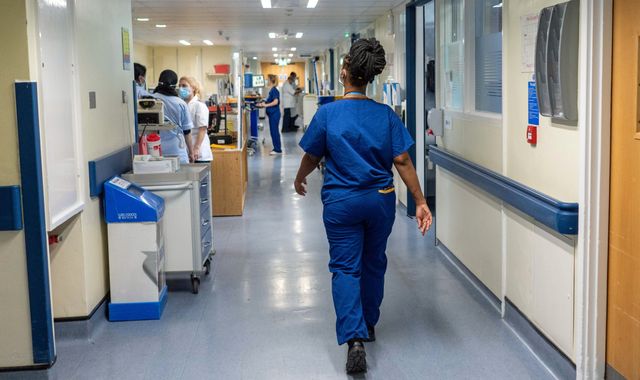The UK government is potentially draining countries of vital medical staff, despite committing not to doing so – and has been warned it should come up with a plan to change direction and help the countries in question.
The independent UK Migration Advisory Committee (MAC) has released its annual report on the state of the UK’s immigration system.
It comes at a particularly prescient time, as the government struggles with the issue following the revelation that net migration is at its highest ever level.
One of the highlighted areas in the report is the health and social care sector.
The MAC report describes how roughly 35% of doctors and 20% of nurses recruited to the UK are from “red list” countries, as described by the World Health Organization (WHO).
Under WHO rules, employers and recruitment agencies must not actively recruit health and social care personnel from “red” countries.
The list is also part of the government’s own code of practice for recruiting in the sector.
Countries on the “red list” include the likes of Bangladesh, Pakistan, Nigeria, Zimbabwe, and Ghana.
Health workers leaving these regions are reportedly “having a negative impact” in their domestic sectors.
The report says it is possible that “social media algorithms” are resulting in UK recruitment adverts being seen by those in red list countries – and it recommends the government “consider careful planning within the UK to reduce reliance and consequent negative effects on red list countries”.
The MAC report also highlights how low-paid foreign care workers are propping up the UK sector – seemingly without a government plan to deal with it.
Current high-levels of foreign recruitment have been precipitated by the addition of the care workers and home workers on the Shortage Occupations List – meaning people entering from abroad can be paid less.
In 2021, 31,800 people applied for a health and care worker visa to work in the UK. From October 2022 to September 2023, this number was 144,000.
The report says the committee previously recommended this “to potentially alleviate some of the difficulties in the short-term whilst funding issues were addressed”.
But none of the other 19 steps they recommended to help address the underlying causes of workforce difficulties have been adopted.
The report also highlighted another issue – that people entering the UK on health and social care visas had been able to bring in dependents with them, such as children.
In 2021, 31,500 dependent visas were applied for on this route – this rose to 173,900 from October 2022 to September 2023.
However, the government has now said that it will be closing this dependent route off.
The MAC report says that, when calculating the benefit to the economy of hiring cheap labour from abroad, the cost of schooling migrant children and other impacts on the state’s purse are “generally ignored” – and cheap foreign labour is not necessarily “almost costless” when compared to “addressing the underlying pay issue”.
The government said this month that it will be reforming the Shortage Occupations List.







